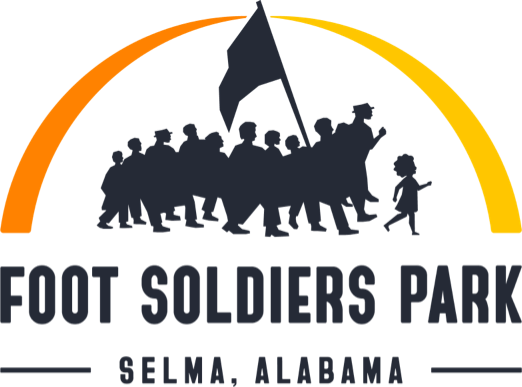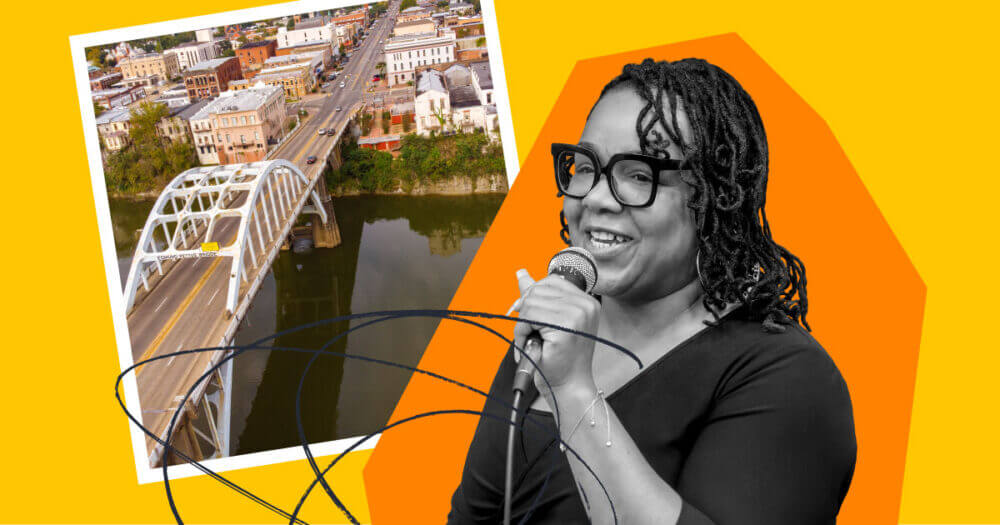
This opinion piece, written by Foot Soldiers Park leaders Ms. Jo Ann Bland and Kimberly Smitherman, was published on the news outlet Common Dreams on June 19, 2025.
At Foot Soldiers Park, Juneteenth is more than a date on the calendar. It’s a declaration, a call to always remember, to resist, and to continue to reimagine what freedom looks like.
For the last four years Juneteenth has become a commemoration of historic significance that has become more powerful and more necessary. As a community, we gather not just to honor history, we gather to face the present and to envision a better future rooted in truth, justice, and collective power.
Juneteenth commemorates June 19, 1865, the day the last enslaved people in Galveston, Texas were finally told they were free—more than two years after the Emancipation Proclamation. That delay wasn’t a historical oversight, it was an intentional strategy of suppression that today, still shows up through the systems we confront daily.
Today one thing is clear, slavery didn’t end, it evolved. It’s been institutionalized in the form of mass incarceration, labor exploitation, generational poverty, voter suppression, and policies that consistently and disproportionately harm Black and Brown communities. 160 years later, Black and Brown people are still profiled, surveilled, underpaid, and denied full access to justice.
And yet, we are still here. Still resisting. Still building our communities up. Still rising.
Our hometown Selma is ground zero for the struggle for voting rights and the fight for the socioeconomic prosperity of people of color in our country. We both span two generations of Black people in Selma. One of us was among the 600 foot soldiers who bravely marched across the Edmund Pettus Bridge and demanded voting rights for Black people – ultimately leading to the passage of the Voting Rights Act in 1965. The other one of us was raised to carry that spirit of activism and determination to protect and preserve those rights for generations to come.
In 2021, at a historic moment for our country, we founded Foot Soldiers Park to preserve Selma’s legacy, memorialize the stories of the everyday people who fueled the Civil Rights Movement, and to position the city’s historical significance into an engine for liberation, economic development, and racial justice.
With a mission rooted in the legacy of Selma’s foot soldiers, we don’t shy away from the truth, we walk directly into it. Because that’s where change is born and transformation begins. We don’t just preserve history, we activate it. We innovate. We organize. We lead.
Juneteenth is a reminder of why the march for liberty and justice is not over, but a moment to recommit to the work ahead.
Despite Selma’s historical significance in shaping the very fabric of this country, the majority-Black city is still struggling to overcome generations of institutional racism and overall neglect. Forty-one percent of the population lives in poverty. Thirty-percent are suffering from food insecurity, and an abysmal $27,000 a year is the average income in the city.
When we founded Foot Soldiers Park, we had a clear goal – to transform Selma, ask hard questions and set a bold agenda to build generational wealth, protect our civil rights, and empower our youth to lead. We are campaigning to fund Selma’s first-ever community and education center, and foot soldiers memorial. This urgently needed hub will be a beacon for leaders, students, and educators to weave the rich tapestry of Selma’s Civil Rights Movement and serve as a conduit for ongoing scholarship in this critical field. As our civil rights are again under attack, we’ll serve as a catalyst for community-led action and civic participation, healing and restoration, youth engagement and activation – building the bench for the next generation of political, business and social justice leaders.
This Juneteenth we need to face the truth – there will be no erasure. What our history shows is how resilience can lead to transformation. Generation after generation we have turned pain into purpose, and memory into motivation to design systems that move us closer to justice.
As Dr. Martin Luther King Jr. said, “A right delayed is a right denied.” Juneteenth reminds us that justice delayed is not justice at all. Freedom withheld is not freedom for all. And the arc of the moral universe does not bend unless we bend it. Together.
For us Juneteenth is not just symbolic. It is sacred. It is strategic. It is where truth, joy, memory and action converge.
Every year we celebrate because our people’s story does not end in chains. We celebrate because our ancestors did more than survive; they organized, educated, resisted, and loved. We celebrate because freedom was never handed to us, we claimed it in 1865, in 1965 and we must claim it today.
In Selma, we never rest and we don’t sugarcoat the truth. We are the foot soldiers of 1965 and the foot soldiers of tomorrow – as agents of change, we will keep marching forward.
Jo Ann Bland and Kimberly Smitherman, both Selma natives, are the founding partners of Foot Soldiers Park. Ms. Bland was one of the youngest foot soldiers who walked across the Edmund Pettus Bridge in 1965 on Bloody Sunday. Ms. Smitherman is a next generation civil rights activist.
On March 22, 2025, Foot Soldiers Park’s very own Kimberly Smitherman was presented with the Perpetuating Empowerment Ignited By Mentors Leadership II award from the Selma Alumnae Chapter of Delta Sigma Theta Sorority for her over 10 years of community involvement and activism and for her unwavering dedication to the city and people of Selma.
This distinguished award aims to identify and celebrate people who consistently demonstrate leadership qualities, such as initiative, organization, and the ability to inspire others – all characteristics that Kim has exemplified and continues to demonstrate throughout her career and role as an effective and inspiring leader.
The award is named in honor of two extraordinary women foot soldiers, Margaret Jones Moore and Amelia Boynton Robinson. Ms. Moore was a courageous educator and civil rights activist in Selma during the 1965 voting rights movement. As a teacher, she organized almost every Black teacher in the city to march to the courthouse demanding the right to vote. It was a key turning point in the protests leading up to Bloody Sunday.
Ms. Boynton Robinson is best known for her role as a prominent civil rights activist who was instrumental in building the voting rights movement in Selma. She made her home a center for strategy sessions for Selma’s civil rights battles, and was among the seventeen people beaten and left unconscious during the Bloody Sunday march. She was also the first Black woman to run for Congress from Alabama.
“I am deeply honored to receive the Leadership II Award from the Selma Alumnae Chapter of Delta Sigma Theta Sorority, Inc., in the names of two extraordinary women, Margaret Jones Moore and Amelia Boynton Robinson,” said Kim. “Their legacies of fearless activism and unwavering commitment to justice are the foundation upon which we build today. At Foot Soldiers Park, we carry their torch forward, igniting, empowering, and perpetuating the movement for equity, truth, and transformation. This recognition is not mine alone. It belongs to the people of Selma and every hand helping to shape a brighter future.”
Congratulations, Kim! Well deserved!
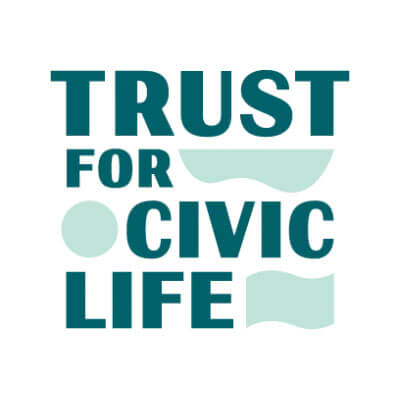
We are thrilled to announce that Foot Soldiers Park has been selected to receive a Civic Entrepreneur grant from the Trust for Civic Life, a new grantmaking collaborative working to create opportunities and spaces for communities to find common ground, connect in new and meaningful ways, solve problems together, and feel confident in a shared future.
This funding will help us deepen our civic engagement efforts and power-building strategies. We believe that community power starts with informed, connected, and active citizens, and this grant allows us to cultivate exactly that.
We will expand our work to create a more civically engaged community by hosting neighborhood-led forums, youth civic education events, and organizing training sessions that equip residents with the tools to lead and advocate for lasting change.
“This investment in Selma is not just about a program—it’s about honoring our legacy while building a future where civic engagement is vibrant, accessible, and transformational,” said Foot Soldiers Park CEO, Kimberly Smitherman. “We can’t wait to put this grant to work for the people of Selma.”
The Trust for Civic Life’s Civic Entrepreneur program supports over 100 grassroots projects in rural communities each year, helping bring people together through innovative and locally rooted ideas. From canning clubs to bike repair initiatives, these projects demonstrate what’s possible when communities are trusted to lead.
Foot Soldiers Park was nominated for the grant by dozens of local leaders and community members close to our work. Of the over three hundred nominations received, only 52 were given grants to activate in their communities.
“Each of the Civic Entrepreneur grantees is using their creativity to get more people interested and involved in their communities,” said Charlie Brown, Trust for Civic Life Executive Director. “These grantees know what their community members want and what resonates with them, and we are excited to provide the resources that will help bring their ideas to life.”
We are excited to partner with the Trust for Civic Life to spark local civic participation and get more people in Selma involved in working together to tackle the community issues that they care about.
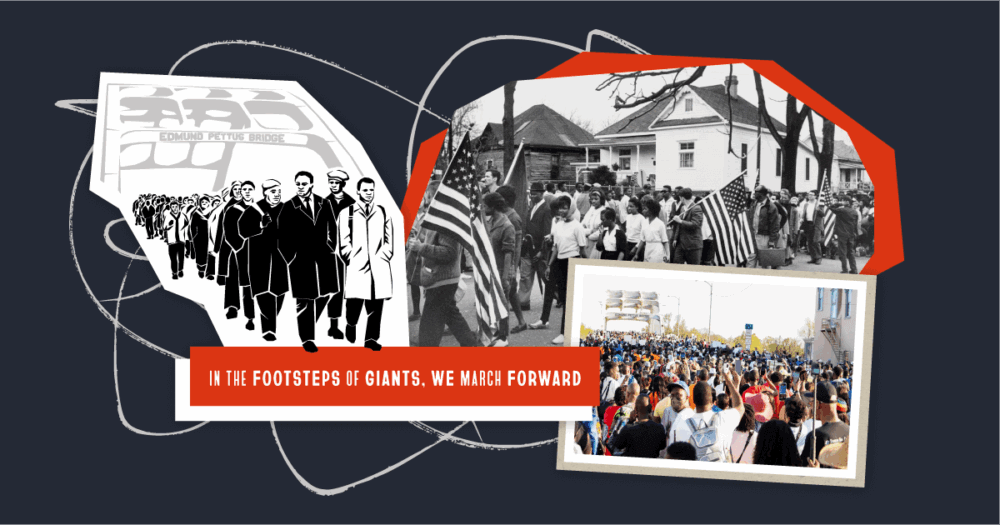
In March, we welcomed thousands of visitors to Selma to honor the original foot soldiers who stepped into history 60 years ago. We commemorated the 1965 activists’ sacrifice, stood in the shadow of their courage, and carried their legacy forward through storytelling, service, and celebration.
From the screening of a forceful documentary featuring foot soldiers from the 1960s, including our founder Jo Ann Bland, to the voices of our new National Youth Advisory Board (YAB) members, our anniversary event was inspiring, unifying and thought-provoking. Dozens of Black women judges from across Alabama, including Vernetta Perkins, the first female district court judge in Dallas County, joined us and retraced the foot soldiers’ steps across the Edmund Pettus Bridge on Bloody Sunday.
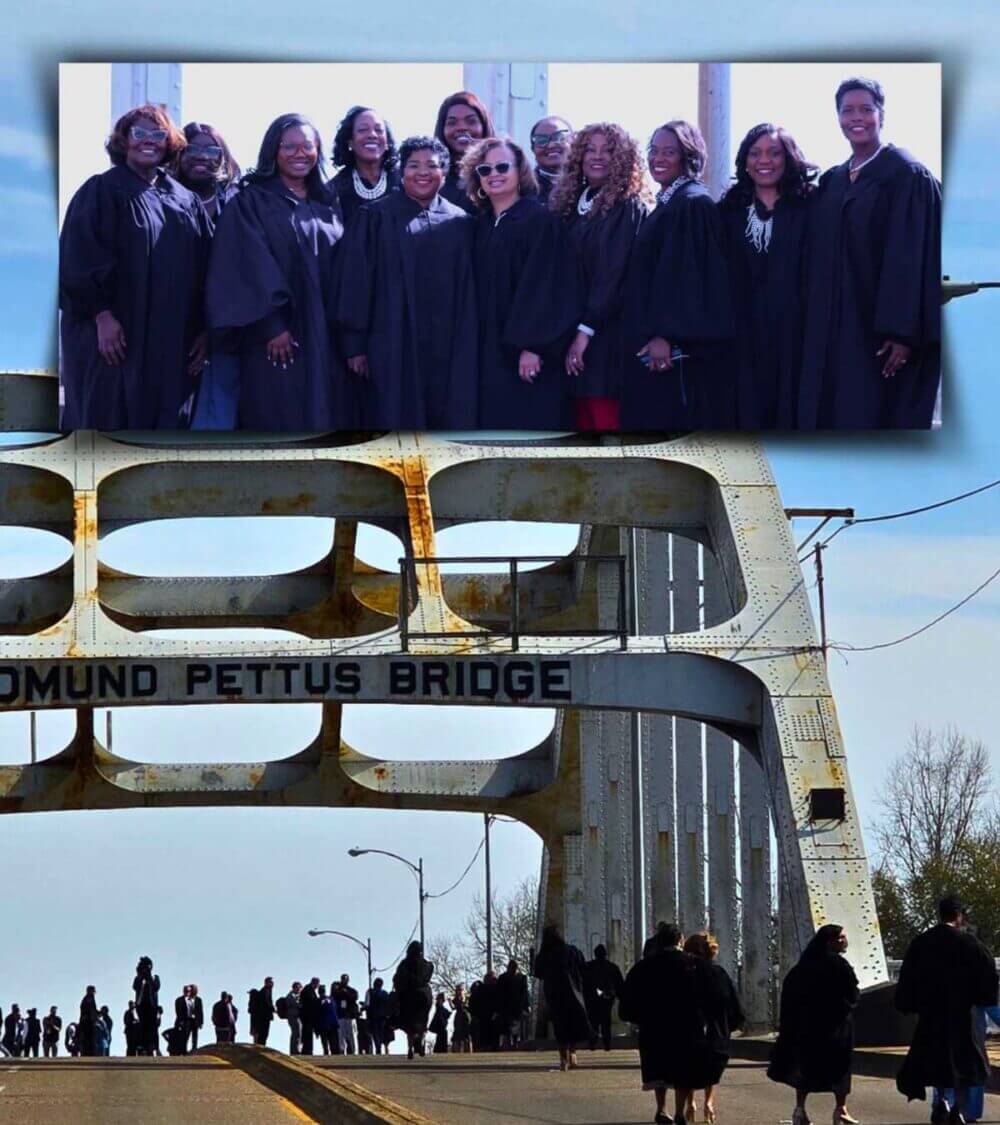
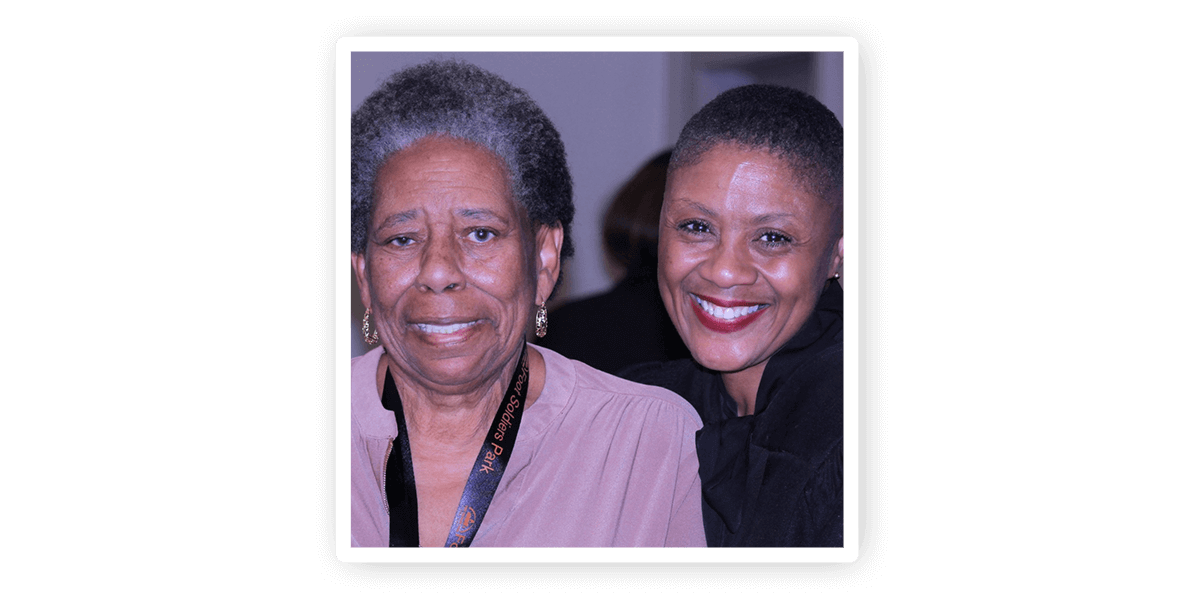
the first female district court judge in Dallas County
Together with our vibrant community, we listened to the stories of foot soldiers, some of whom were children at the time, witnessed law enforcement brutally beating activists or experienced it themselves.
“[State troopers] had billy clubs. They had tear gas,” said foot soldier Florence Ford, describing Bloody Sunday when she and other activists tried to cross the Bridge. “And we ran as fast as we could. And the horses were still running behind us and trying to run down on us.”
Today, as we look back on the 60th anniversary of the Selma to Montgomery marches, we are humbled by the fortitude and bravery of those who came before us and paved the way for some of the most sacred rights we have as individuals and a democratic nation.
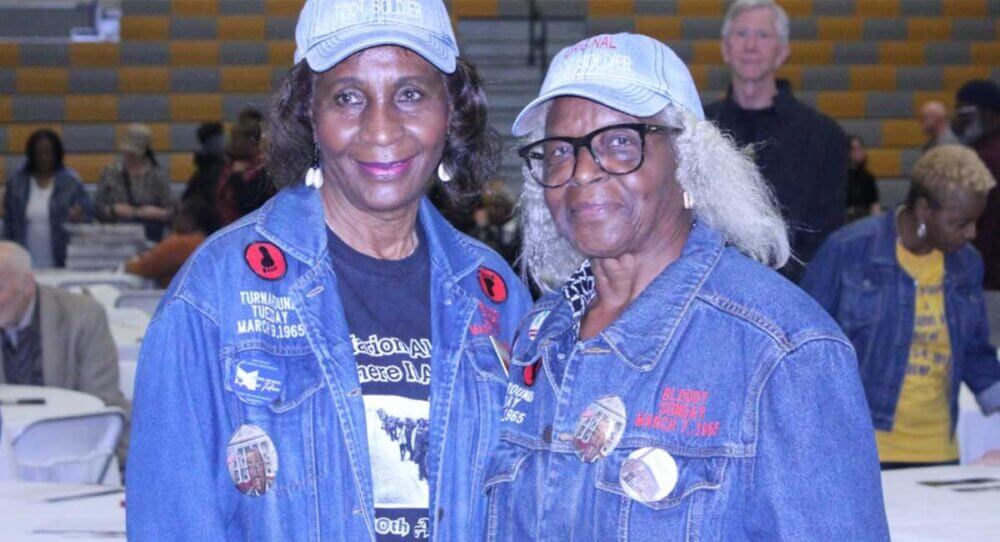
“I’m very, very grateful for my involvement in [the marches],” said foot soldier Jeanette Howard who was one of the seventeen injured activists that day. “I call it a revolution because it was more than a movement that changed the world. The struggle continues, however.”
We also heed their words, and recognize the long road ahead. To that end, at Foot Soldiers Park we’re working with young people to learn and grow as informed and inspired leaders, ready to take on the ongoing civil rights challenges and chart their own brighter future. We are developing a robust national youth platform for civic engagement, peer learning and leadership development to serve as a political bench and movement builder.

At the event, we pinned this year’s new class of red coats as YAB members. We also inaugurated our new young adult group – the gold coats – former YAB members who’ve graduated from high school and will be turning 19. They will serve as “elders” for the red coats, offering advisory support and fundraising activities.
“What excites me most is seeing future generations of YAB build on this foundation, reaching even greater heights and achieving things we’ve only dreamed of. The work continues and the potential is limitless,” said Sydney Pritchett, one of the gold coats.
“One of the most powerful moments of the 60th anniversary was seeing the unity and passion of everyone coming together to celebrate our history, especially those who traveled here,” said Jolie Jackson, another YAB member. “It really emphasized the significance of Selma’s historic events and the importance of our voices.”
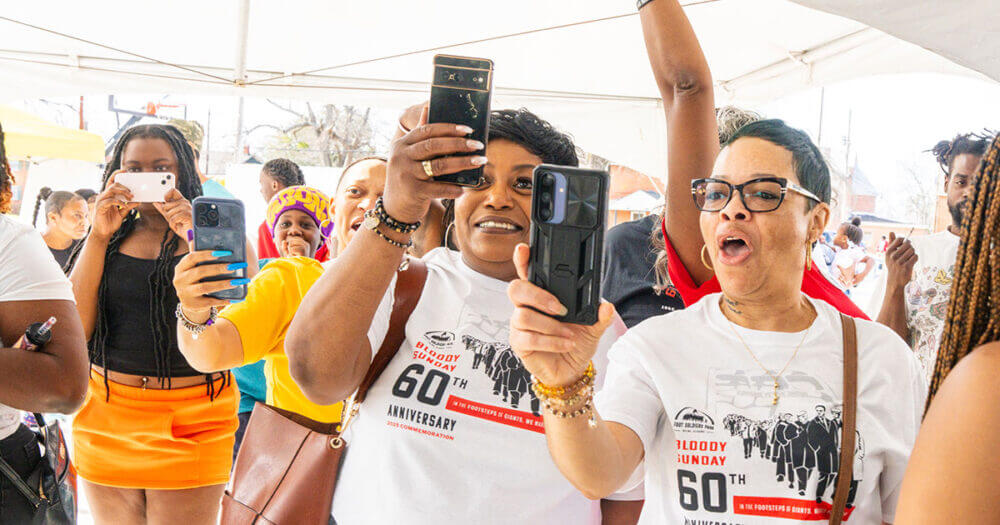
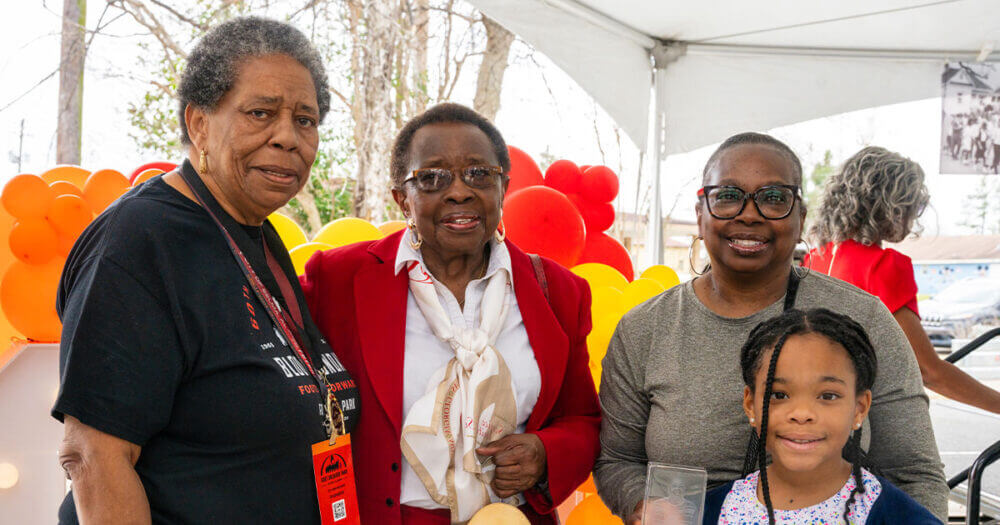
The anniversary event was a powerful marker for Foot Soldiers Park as we step into the next 60 years focused on providing Selma with the opportunity to position its historical significance as an engine for economic development and liberation, and cultivating and training the next generation of changemakers and leaders to transform their own communities.
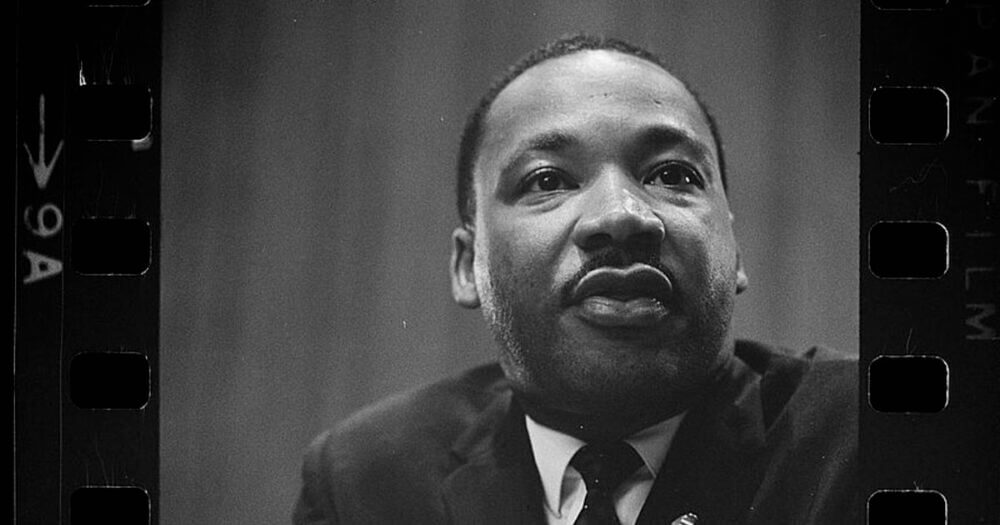
Dr. King, in his Letter from a Birmingham Jail, famously said “Injustice anywhere is a threat to justice everywhere. We are caught in an inescapable network of mutuality, tied in a single garment of destiny. Whatever affects one directly, affects all indirectly.” And although we are still affected, we can and do dream of a future free from the shackles of racism, bigotry, and hatred which we’ve faced for hundreds of years.
For those who started marching 60 years ago, for those who’ve carried their legacy forward, and for those future foot soldiers who will ensure that while history is not forgotten, it’s also not repeated, we stand with you, hand in hand.
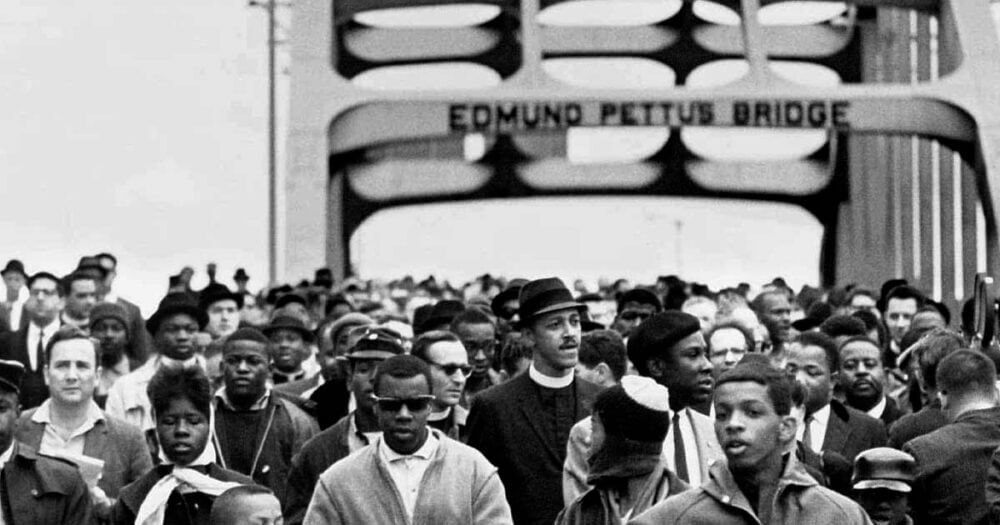
“What happened in Selma is part of a far larger movement which reaches into every section and state of America. It’s all of us who must overcome the crippling legacy of bigotry and injustice, and we shall overcome.”
— President Lyndon B. Johnson
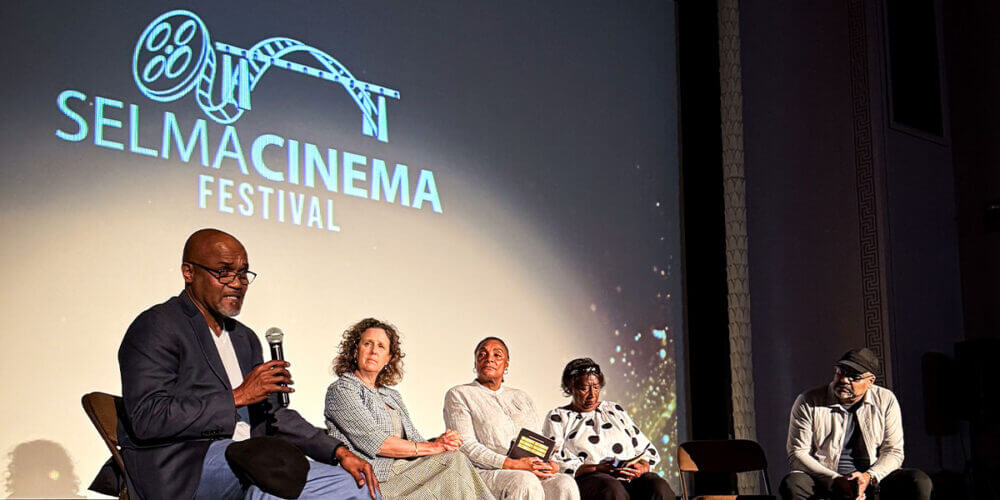
By Carey Fountain, Director of Programs and Partnerships, Foot Soldiers Park
This past weekend in Selma felt like history unfolding all over again—but this time, through the lens of a projector, the voices of filmmakers from around the world, and the energy of a community hungry for healing, art and new perspectives.
The event was transformative! For Selma. For Selma’s youth. For every guest who walked through the doors of the Walton Theater. And for me.
It was an honor to host filmmakers and creatives from every corner of the U.S. and the globe, with over 200 film submissions. This event was about more than just showcasing great art—it was about placing Selma at the center of storytelling once again. Our aim was to create space for the kinds of stories that challenge conventions, uplift, and connect us—and that’s exactly what happened.
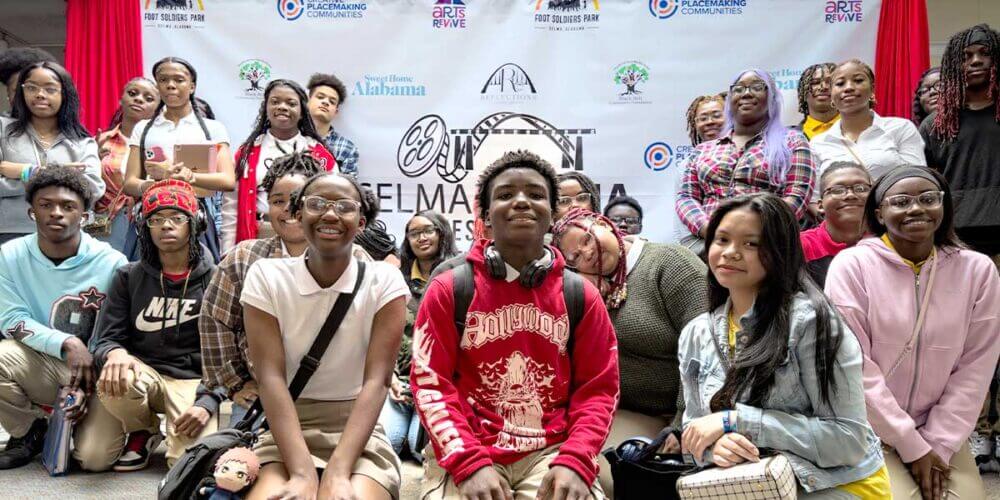
Many of the attendees had never stepped foot in a movie theater before, including some of the young people who came with their schools. One student shared after a screening, “Even though [in the film] they had financial problems, they still pushed forward and followed their dreams. That really spoke to me.” That’s the power of cinema—to inspire, encourage and give people a chance to reflect or see themselves in the stories of others in real time.
Pamela Davis Noland, whose short film Room for Dessert won Best U.S. Short, delivered a story that stuck to our ribs in every way possible. Originally written as a stage play in 2015, it was born out of grief and resistance during a time of heightened racial violence. Her film, she told us, was about “what happens when justice is no longer enough.” In her words:
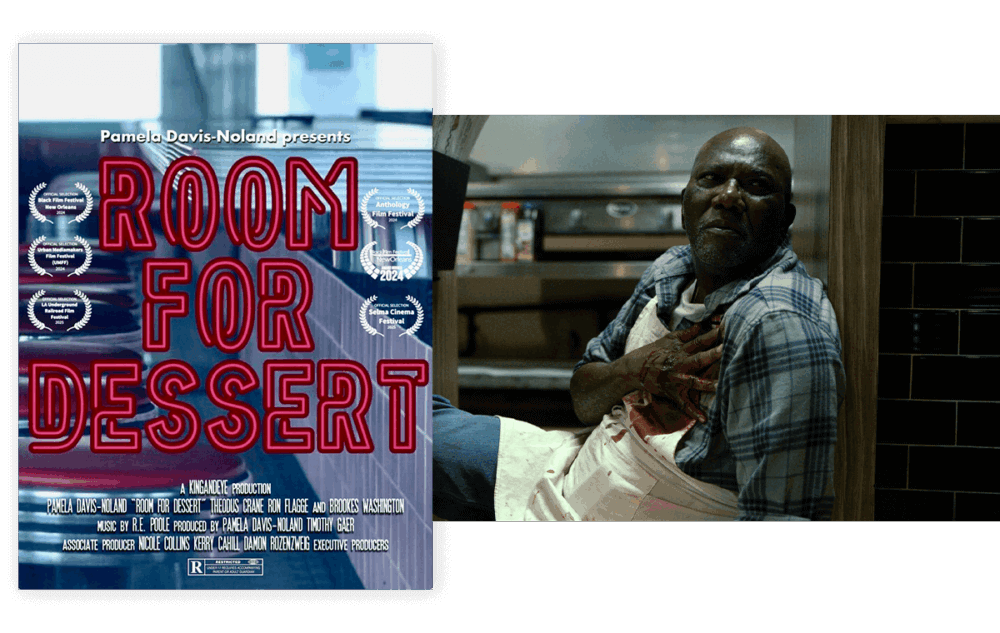
“This is our contribution to that foot soldier fight. My husband and I were both born in 1965, right when all the things in Selma were going on. Sixty years later, we’re still fighting. This is how we fight—with our stories.”
We were all moved, and I’m still thinking about her film.
Judge Jimmy Nunn, our county’s probate judge and a long-standing public servant, reminded us how film can serve as a bridge between generations:
“There’s so much that you can learn from films… especially for our children. Most of them weren’t born in the ’50s or ’60s. If they don’t read it in a book or hear it from someone, how else will they know? This festival helps make history real—and part of the educational process.”
That’s why at Foot Soldiers Park, we put youth at the heart of everything we do including this festival. On Saturday April 5, we held our Student Film Showcase featuring young filmmakers’ work hailing from Alabama to Appalachia:
- Foot Soldiers Park’s Youth Advisory Board in collaboration with Troy University film professor Will Jacks and his students
- Best Buy Teen Tech Center at Wallace Community College in Selma
- Appalshop, a media, arts, and education center for students aged 14-24, located in Whitesburg, Kentucky in the southern Appalachian region
These were stories shaped by young voices, rooted in local experience and global possibility. Seeing their films on the big screen before an audience? That’s the kind of moment that can transform and stick with young talent—for a lifetime.
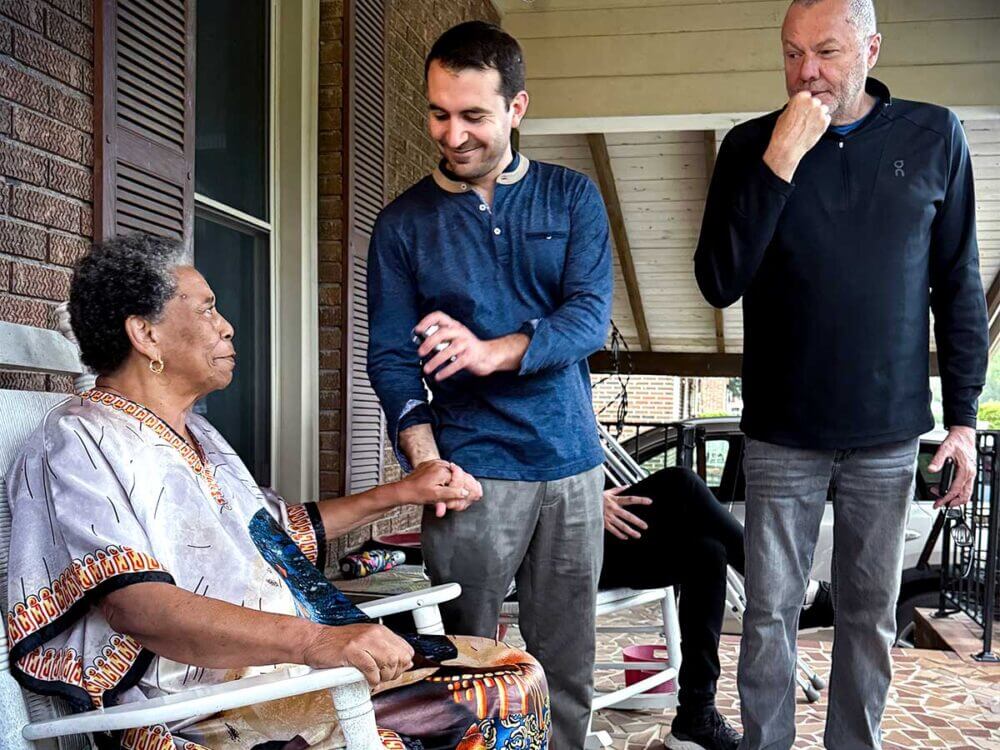
It was a privilege to work alongside the festival’s jury, including:
- B.K. Fulton, producer
- Omar Turner, CEO of Binns Media Group
- Katie Fernandez, ESPN Senior Director
- Loki Mulholland, filmmaker, Foot Soldiers Park Board member and descendant of a foot soldier
- Toni Toney, Alabama educator artist
- Donovan Duncan, Executive Vice President of Urban Strategies, Inc. and Foot Soldiers Park Board chair
It was exciting to see the festival receive attention beyond Selma. Actress Whoopi Goldberg sent us words of encouragement and support through her good friend Juror Fulton.
“Keep going,” Ms. Goldberg said. “Art can heal!”
Juror Mulholland summed up the power of this festival beautifully:
“Film moves people’s hearts. It tells the stories that some are trying to erase. That’s why festivals like this matter—especially in a place like Selma.”
And finally, for many of us who live and work here, this festival wasn’t just about watching movies—it was about making space for the next chapter of Selma’s story.
In many ways, it felt like giving birth. Painful. Emotional. Yet profoundly beautiful. What came out of that process was giving life to something new—something we can grow together. And now, our charge is to nurture the seeds we planted.
Thank you to every volunteer, partner, juror, filmmaker, funder, student, and dreamer who helped make this festival a success. Selma needed this and we are grateful for your commitment and energy.
Until next year—and every month in between.
With love and respect,
Carey Fountain

“A man dies when he refuses to stand up for that which is right. A man dies when he refuses to stand up for justice. A man dies when he refuses to take a stand for that which is true.
So we’re going to stand up amid horses. We’re going to stand up right here in Alabama, amid the billy-clubs. We’re going to stand up right here in Alabama amid police dogs, if they have them. We’re going to stand up amid tear gas! We’re going to stand up amid anything they can muster up, letting the world know that we are determined to be free!”
— Dr. Martin Luther King, Jr., March 25, 1965
Six decades ago on March 7, 1965 hundreds of people, young and old, marched to ensure that African Americans could exercise their right to vote. For days, they didn’t stop despite police brutality that left many injured. On March 9th, Dr. Martin Luther King led roughly 2,500 people to the Pettus Bridge before turning the marchers around to obey court orders. And on March 21, thousands of people joined along the way from Selma to Montgomery, with roughly 25,000 people entering the capital on the final leg of the march. On March 25, the marchers made it to the entrance of the Alabama State Capitol building, with a petition for Gov. George Wallace.

Image on right: Civil rights marchers on the south side of the Edmund Pettus Bridge in Selma, Alabama, on Turnaround Tuesday. Source: Alabama Department of Archives and History.
The Voting Rights Act was passed by Congress and President Lyndon B. Johnson signed it into law on August 6, 1965. This historic legislation was designed to eliminate legal barriers at the state and local level that prevented African Americans from exercising their right to vote under the 15th Amendment — after nearly a century of unconstitutional discrimination.
This 60th anniversary, Foot Soldiers Park calls for a New March on Selma – a call for bold new action to ignite change in which our communities have the resources and tools to exercise their civil rights and duties as equal citizens, build wealth, access education and gain job skills. A call for healing from generational trauma and most importantly, a call to rise up again and shape our own futures.
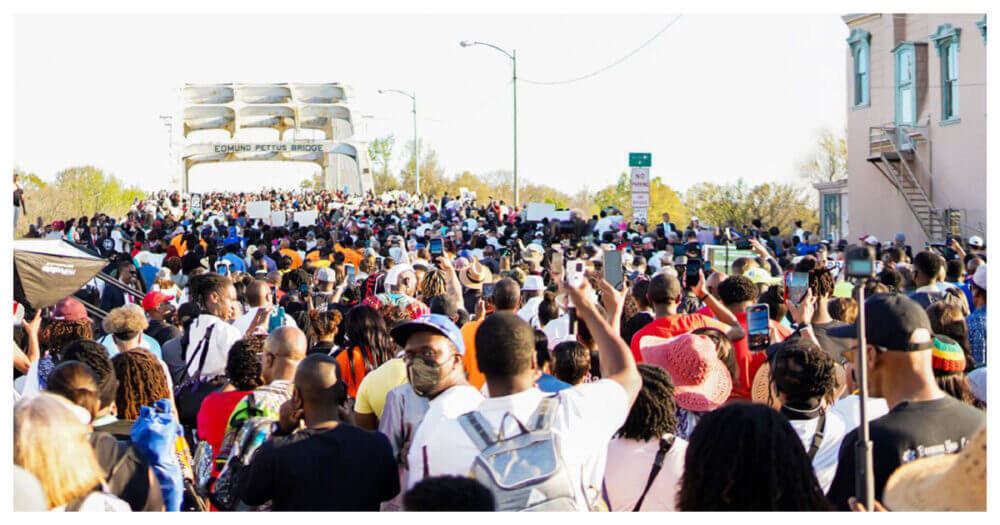
Every jubilee, tens of thousands of people visit Selma to retrace the steps of the foot soldiers of 1965 across the Edmund Pettus Bridge, including US Presidents, members of Congress and other dignitaries to showcase their respect and commitment to the civil rights movement. But when we look back, the majority Black Selma has reaped little reward for its iconic status in American history.
This 60th anniversary, it is vitally important to honor the sacrifices of those who marched for our voting rights before us, risking their lives and livelihoods. Their courage and resilience is what inspires and guides us as we take on our own journey to justice and liberation.
Today, it is urgent that we move beyond remembrance and translate those sacrifices into steps to build a better future for Selma, for ourselves and for future generations in spite of shifting politics, new challenges and persistent disinvestment.
At Foot Soldiers Park we have a clear purpose – to fuel the civil rights movement of the past, present and future as a means to achieve racial justice, economic prosperity, and liberty for all. As we look to the next 60 years in Selma and beyond, we are working to drive impact through:
- Providing the Selma community with the opportunity to position its historical significance as an engine for economic development and liberation
- Educating young people and adults about their civic duty and training them to advocate for change within their own communities
- Arming Selma residents with the knowledge and tools for financial literacy and homeownership to build long-term financial security
- Co-creating with young people a robust national youth platform for civic engagement, peer learning, organizing and leadership development
- Offering resources and services that center on healing the whole self – body, spirit and mind – from the trauma of historical oppression as a pathway to true equity and liberation
On this 60th anniversary of Bloody Sunday, despite the challenges ahead of us, we invite you to stand strong with us and march for a new day of self-determination, self actualization, unity and transformation.
60th Anniversary Commemoration
Join our team for a commemoration event on March 8, 2025 with original and future foot soldiers, family-friendly festivities, live music and more!
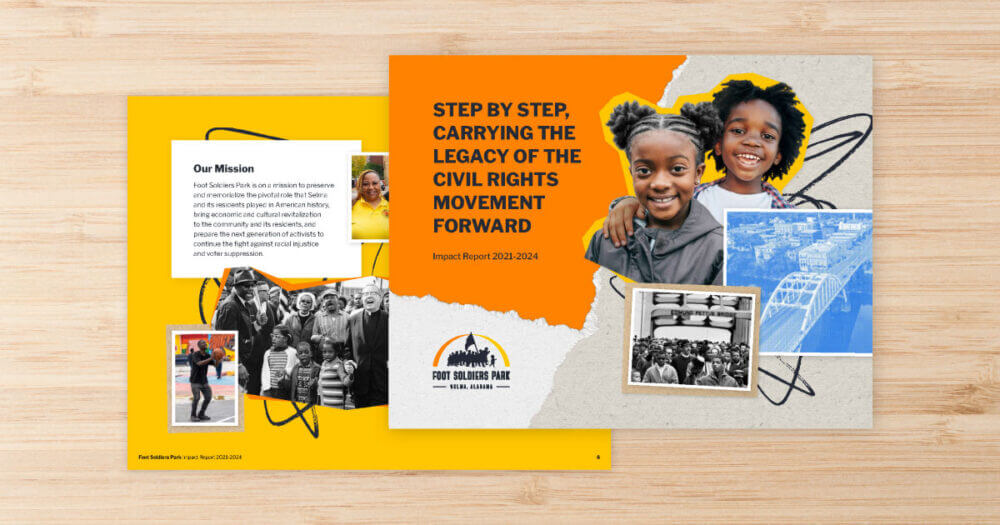
As we enter a new year, we are marking a major milestone with our very first impact report.
We’re excited to share our inaugural impact report! This report marks a significant milestone for Foot Soldiers Park – a celebration of the progress that our organization, community and supporters have made together and an opportunity to reflect on the journey that brought us where we are today.
For years, our co-founders Chief Strategy Officer Ms. Jo Ann Bland and CEO Kimberly Smitherman recognized a need to safeguard the stories of the Selma people who created the conditions for the marches across Edmund Pettus Bridge, the places where they gathered, and their critical role in shaping voting rights in the U.S. They also recognized an opportunity to leverage the city’s historic legacy as a blueprint for fighting for the civil rights of today and as an engine for economic development in a city that has struggled for decades to provide its residents real opportunity to thrive.
In 2021, the two Selma natives founded Foot Soldiers Park with the vision to improve the wellbeing of Selma’s underserved residents by bringing economic opportunities to the city and developing amenities, resources, and programs that are co-created with and for the benefit of the community.
In just three years, Foot Soldiers Park has made huge strides toward building a vibrant community-driven organization poised to lead, innovate and build a brighter future for Selma.
As we look ahead with a bigger vision and more ambitious goals, take a moment to join us in celebrating the stories, partnerships, and milestones that have shaped who we are today and where we are headed.
To all of the community members we are grateful for your trust and partnership. And to all of our partners, donors and funders we value your commitment and investment in our success.
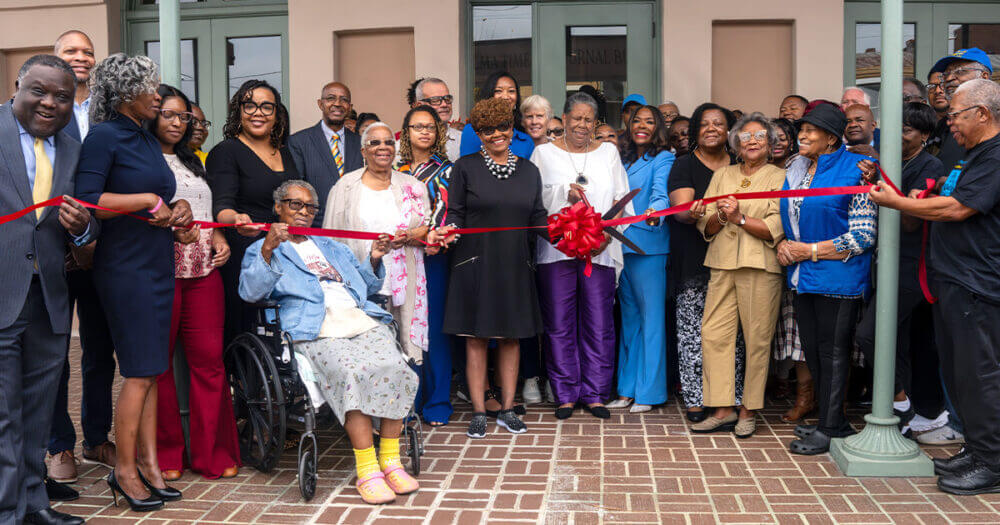
Dreams really do come true, one brick at a time!
October 28, 2024 was a great day for downtown Selma! Two years after renovations began at the Selma Times-Journal building on Water Ave, Selma’s own Foot Soldiers Park and Common Power, a Seattle-based civic engagement organization, came together to cut the ribbon on their shared building, signifying their commitment to Selma and to each other.
The historic Selma-Times Journal buildings sit at the crossroads of history and on one of the busiest streets in Selma –a perfect place to welcome visitors and a place of significance and pride for our local community.
Foot Soldiers Park started as the dream of our founder, Ms. Jo Ann Bland, a foot soldier in the Bloody Sunday march of 1965, who has dedicated her life to the preservation of our history and the movement for voting rights and democratic freedoms locally and nationally.
Foot Soldiers Park CEO, Kimberly Smitherman along with Ms. Bland, welcomed the ribbon cutting ceremony with excitement for this new milestone in the organization’s growth and were joined by local leaders and community members.
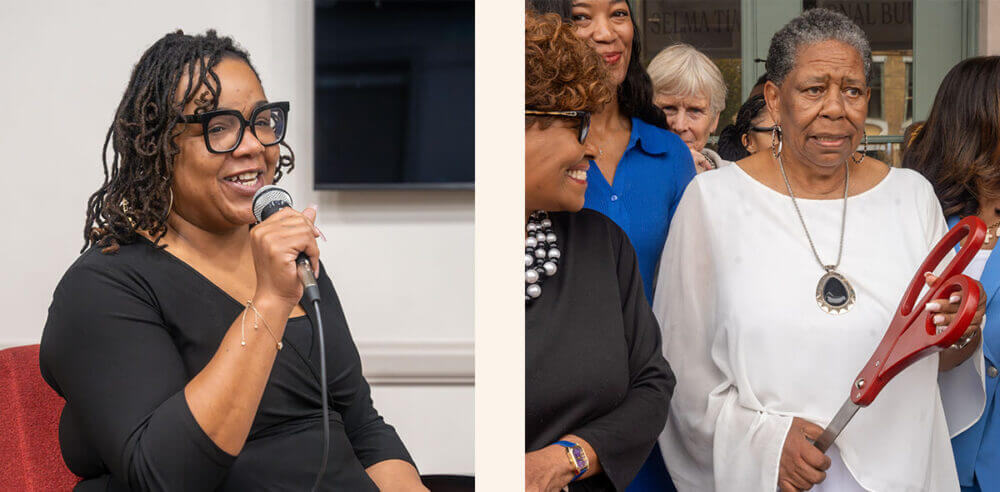
“This is not just a ribbon cutting,” says Kimberly. “This is a combination of dedication, passion and collaboration that has taken place for us to be able to preserve this historic building.” The new offices will provide a strong foundation for achieving Foot Soldiers’ mission and an important step forward in making the organization’s vision a reality.
Seattle’s Heyday Holdings, LLC purchased the building in 2022, and from the start, were dedicated to helping Foot Soldiers Park to have the space to envision and build a new future for Selma; one that respects and celebrates the legacy of the original foot soldiers of the civil rights movement, providing an immersive experience for visitors from around the globe to come and learn, and most importantly a place where young people can convene, dream and work on what they want their future to be .
Steve Romein of Heyday Holdings, LLC shared “We asked Ms. Jo Ann what she needed, and she said ‘I need a room that will hold at least three buses full of fifty people each.’” Even though at the end the new auditorium is closer to two-bus capacity, Romein and his partner kept Bland’s vision front and center which includes a gift shop and soon to be developed park, memorial, playground and a community center that will be nested at the heart of the George Washington Carver homes (GWC) community. The Selma Times-Journal covered the event and further highlighted Ms. Bland’s vision: “I wanted a building that could open in George Washington Carver homes that was so nice that everybody would want to come there, because we rarely put anything nice in the hood. Things are thrown up there and left, and the Foot Soldiers Park will not be like that. It means too much to me and too much to the foot soldiers.”
For Foot Soldiers, the new headquarters at the historic Selma Times-Journal Building is more than an act of preservation; it’s a symbol of hope for Selma’s future as a beacon for transformation, liberation and ingenuity.
“As we’re opening the doors of this building, we’re also opening doors to new possibilities, new collaborations, more visitors and a renewed commitment to serving our community,” said Kimberly. “We’re excited to start the next chapter of the Selma Times-Journal buildings as the Foot Soldiers’ new headquarters and we invite you all to be a part of it!”
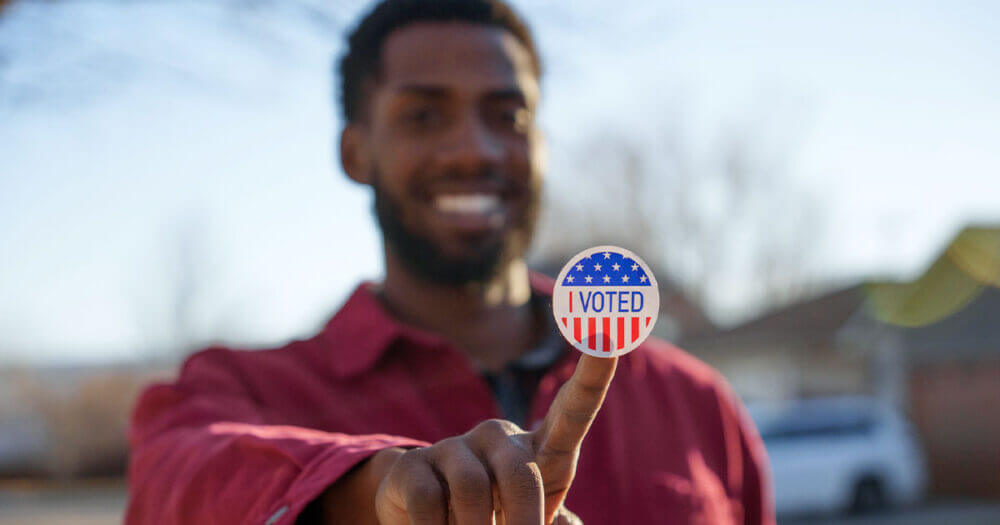
We’ve made it! Today is the day to show up at the polls and cast your right to vote if you haven’t done so already!
Remember –the foot soldiers of the Civil Rights Movement risked their lives in Selma and around the country to secure your right to select the people who represent you at all levels of government! Please don’t take this precious right for granted.
Here in Selma, the Foot Soldiers Park Community Engagement Corps (CEC) initiative has been out in force with voter education efforts, civic engagement, youth outreach, and community engagement activities.
Here’s what we’ve done so far:
- Over 2,743 hours logged in training, phonebanking, canvassing, community billboarding and hosting special events
- 5000+ cards with QR codes distributed for people to register to vote
- 10,480 phone calls made to potential voters
- 4 voter registration block parties organized in Selma’s voting districts
- 100% of Selma’s high schools visited to register 18-year-old students to vote
- 57 applications facilitated to restore voting rights to ex-felons
As in 1965, voting is still at the heart of the civil rights movement and we’re proud to carry the legacy of the original foot soldiers forward.

